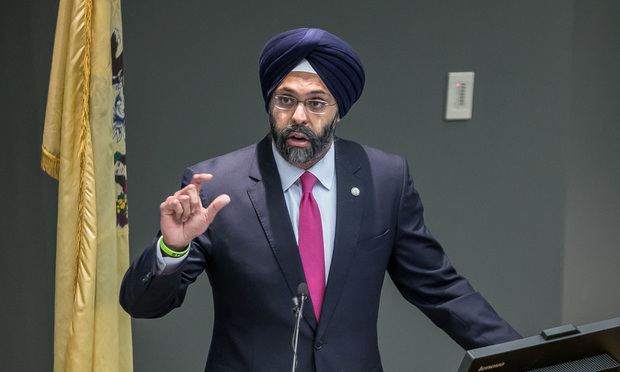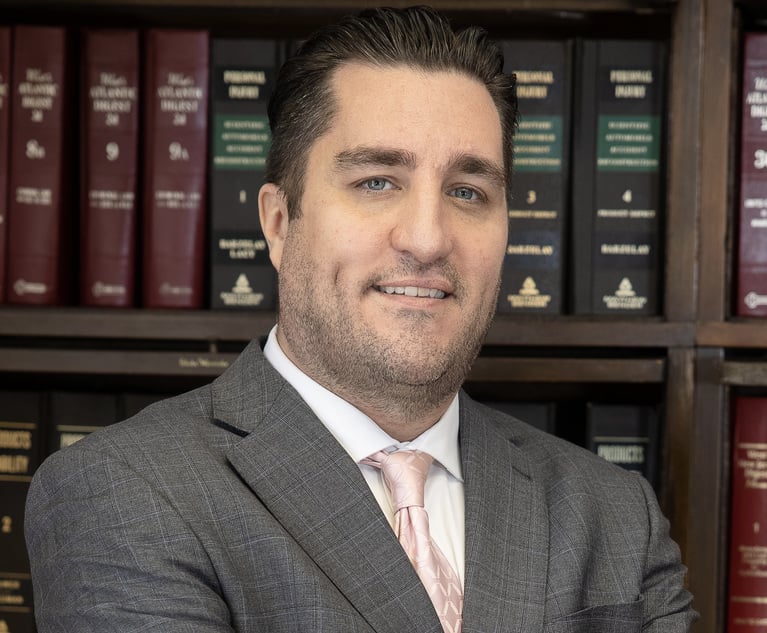Town Defiant After NJ AG Opposes 'Residents-Only' Traffic Ordinance
A lawyer who sued Leonia over its restrictions on nonresident motorists filed an order to show cause on Friday, asking the town to stop enforcing its law in light of an opinion from the Attorney General's Office declaring Town Ordinance 2018-5 invalid.
May 04, 2018 at 04:07 PM
4 minute read
 Gurbir S. Grewal, New Jersey attorney general, speaks at Seton Hall University School of Law in February 2018
Gurbir S. Grewal, New Jersey attorney general, speaks at Seton Hall University School of Law in February 2018 New Jersey Attorney General Gurbir Grewal's office has spoken out against locals-only driving restrictions enacted in the towns of Leonia and Weehawken, but that might not be enough to stop the controversial traffic-taming practice.
A lawyer who sued Leonia over its restrictions on nonresident motorists filed an order to show cause on May 4, asking the town to stop enforcing its law in light of an opinion from the Attorney General's Office declaring Town Ordinance 2018-5 invalid. But the town's mayor has said in published accounts that Leonia did not agree with the state's contention that the restrictions it imposed lie outside the authority of a municipality.
In January, Leonia posted red signs warning nonresidents to stay off of roughly 60 secondary streets in the town, lest they face a $200 fine. The restrictions are only in effect at certain hours of the day. Residents of the town were issued yellow hanging tags for their cars, so police can differentiate between locals and outsiders. The law was enacted to cut down on traffic, especially from drivers seeking shortcuts to the George Washington Bridge who are directed onto secondary streets by navigation applications such as Waze. Fort Lee attorney Jacqueline Rosa, who is self-represented, filed a suit Jan. 30 to have the Leonia ordinance deemed invalid.
Weehawken enacted a similar ordinance that went into effect Feb. 13.
Rosa said she wrote to Grewal after discovering a 1955 formal opinion from the Attorney General's Office invalidating an ordinance enacted by Demarest which barred designation of “no through” streets, prohibiting traffic whose destination is not on the street in question. She asked Grewal if that opinion still stands, and the state concluded that it does.
Letters sent on March 16 by Kevin Jespersen, chief counsel to the attorney general, to Leonia and Weehawken town officials say the ordinances are invalid because they were not reviewed by the state Department of Transportation. The letters also cite the 1955 opinion by then-Attorney General Grover Richman Jr. in the Demarest case.
“There is no inherent power vested in a municipality by which it may legally restrict the right of the public to the free use of streets and roads. Any right of the municipality to pass ordinances and resolutions regarding the flow of traffic over its streets and highways can arise only by legislative grant; and there has been none,” Richman said in a letter to Frederick Gassert Jr., who was then director of the Division of Motor Vehicles.
Both letters instructed local officials to refrain from enforcing the ordinances “or the Attorney General will be required to take appropriate action to enforce the law.”
Jespersen encouraged Leonia and Weehawken officials to work “with the New Jersey Department of Transportation to discuss a lawful resolution” of their traffic problems. In each case, the Attorney General's Office said it was willing to “facilitate and participate” in the meetings.
Leonia officials did not respond to calls from the Law Journal. Mayor Judah Ziegler said on northjersey.com that the town would not withdraw its ordinance and that the attorney general was not concerned about pedestrian safety in the town. Ziegler told the website that the town did not share the attorney general's belief that Leonia lacked authority to take the actions it did.
Rosa said she was “pleased” that the Attorney General's Office stepped into the controversy, and that she was “shocked to say the least” that the mayor is not accepting the attorney general's interpretation of the law.
Rosa says she has spoken to many people who have been questioned by police in Leonia while on the way to patronize local businesses, to make doctor appointments or to visit friends. She says she passes through Leonia on her daily commute, but has not received a ticket in Leonia. She is not concerned about lack of standing, since standing rules for a prerogative writ action are very flexible, requiring only a loose public interest, a standard she says she can meet.
Weehawken's municipal attorney, Richard Venino, said the town had not enforced its ordinance, which only applies to handful of locations. He said town officials met in early April with representatives from the Attorney General's office and the state Department of Transportation to discuss possible solutions to the traffic problems.
This content has been archived. It is available through our partners, LexisNexis® and Bloomberg Law.
To view this content, please continue to their sites.
Not a Lexis Subscriber?
Subscribe Now
Not a Bloomberg Law Subscriber?
Subscribe Now
NOT FOR REPRINT
© 2025 ALM Global, LLC, All Rights Reserved. Request academic re-use from www.copyright.com. All other uses, submit a request to [email protected]. For more information visit Asset & Logo Licensing.
You Might Like
View All
An Overview of Proposed Changes to the Federal Rules of Procedure Relating to the Expansion of Remote Trial Testimony
15 minute read
Appellate Division Rejects Third Circuit Interpretation of NJ Law, Says No Arbitration for Insurance Fraud
4 minute read

'Go 12 Rounds' or Settle: Rear-End Collision Leads to $2.25M Presuit Settlement
Trending Stories
- 1Midsize Firm Bressler Amery Absorbs Austin Boutique, Gaining Four Lawyers
- 2Bill Would Allow Californians to Sue Big Oil for Climate-Linked Wildfires, Floods
- 3LinkedIn Suit Says Millions of Profiles Scraped by Singapore Firm’s Fake Accounts
- 4Supreme Court Agrees to Hear Lawsuit Over FBI Raid at Wrong House
- 5What It Takes to Connect With Millennial Jurors
Who Got The Work
J. Brugh Lower of Gibbons has entered an appearance for industrial equipment supplier Devco Corporation in a pending trademark infringement lawsuit. The suit, accusing the defendant of selling knock-off Graco products, was filed Dec. 18 in New Jersey District Court by Rivkin Radler on behalf of Graco Inc. and Graco Minnesota. The case, assigned to U.S. District Judge Zahid N. Quraishi, is 3:24-cv-11294, Graco Inc. et al v. Devco Corporation.
Who Got The Work
Rebecca Maller-Stein and Kent A. Yalowitz of Arnold & Porter Kaye Scholer have entered their appearances for Hanaco Venture Capital and its executives, Lior Prosor and David Frankel, in a pending securities lawsuit. The action, filed on Dec. 24 in New York Southern District Court by Zell, Aron & Co. on behalf of Goldeneye Advisors, accuses the defendants of negligently and fraudulently managing the plaintiff's $1 million investment. The case, assigned to U.S. District Judge Vernon S. Broderick, is 1:24-cv-09918, Goldeneye Advisors, LLC v. Hanaco Venture Capital, Ltd. et al.
Who Got The Work
Attorneys from A&O Shearman has stepped in as defense counsel for Toronto-Dominion Bank and other defendants in a pending securities class action. The suit, filed Dec. 11 in New York Southern District Court by Bleichmar Fonti & Auld, accuses the defendants of concealing the bank's 'pervasive' deficiencies in regards to its compliance with the Bank Secrecy Act and the quality of its anti-money laundering controls. The case, assigned to U.S. District Judge Arun Subramanian, is 1:24-cv-09445, Gonzalez v. The Toronto-Dominion Bank et al.
Who Got The Work
Crown Castle International, a Pennsylvania company providing shared communications infrastructure, has turned to Luke D. Wolf of Gordon Rees Scully Mansukhani to fend off a pending breach-of-contract lawsuit. The court action, filed Nov. 25 in Michigan Eastern District Court by Hooper Hathaway PC on behalf of The Town Residences LLC, accuses Crown Castle of failing to transfer approximately $30,000 in utility payments from T-Mobile in breach of a roof-top lease and assignment agreement. The case, assigned to U.S. District Judge Susan K. Declercq, is 2:24-cv-13131, The Town Residences LLC v. T-Mobile US, Inc. et al.
Who Got The Work
Wilfred P. Coronato and Daniel M. Schwartz of McCarter & English have stepped in as defense counsel to Electrolux Home Products Inc. in a pending product liability lawsuit. The court action, filed Nov. 26 in New York Eastern District Court by Poulos Lopiccolo PC and Nagel Rice LLP on behalf of David Stern, alleges that the defendant's refrigerators’ drawers and shelving repeatedly break and fall apart within months after purchase. The case, assigned to U.S. District Judge Joan M. Azrack, is 2:24-cv-08204, Stern v. Electrolux Home Products, Inc.
Featured Firms
Law Offices of Gary Martin Hays & Associates, P.C.
(470) 294-1674
Law Offices of Mark E. Salomone
(857) 444-6468
Smith & Hassler
(713) 739-1250






